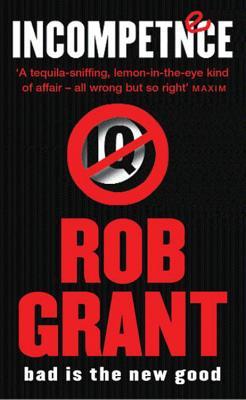Incompetence (Rob Grant, 2003) is a comedy noir-esque novel. The author is best known for his work as one half of Grant Naylor, the writers of Red Dwarf. Set in the near future where United States of Europe Article 13199 has banned basing hiring and firing practices on a person’s competence level, Harry Salt — deep undercover agent for an British/European intelligence agency — has to unravel the mysterious death of fellow cell member Klingferm, committed by the anonymous and dangerous Jack Appleseed.
If that sounds a bit heavy going for a comedy novel, there is no need to fret: Incompetence doesn’t let things like an international race to find a cold-blooded murderer before he kills again get in the way of hilarious multi-chapter rants against easy targets like airport security, train timetables, and hotel service.
This results in a disjoint feeling, as the plot-humour balance is left completely out of whack. For example, somewhere around the book’s last 20 pages, Grant realises that he’s managed to avoid telling an actual story and has to rush the exposition in less space than he spends describing the humiliations Harry undergoes on a train journey, or dealing with hotel receptionists.
Incompetence is a theme, with the running gag that competent people are stuck in low grade positions such has sergeant or intern professor, while psychopaths and the truly stupid are elevated to the upper echelons. Possibly Grant had heard of the Dilbert principle, which describes this sort of career advancement precisely, where nature takes the least productive members of the workforce and places them away from the useful people — higher up in the pecking order, but out of the way nonetheless. This is an overly pessimistic view, but I’m sure everyone has had that ‘one boss’ whose position escaped all reason and common sense, so the sentiment will ring somewhat true.
The story is told in the first person by the protagonist, a largely frustrated ‘big man’ detective-spy who takes enough physical punishment throughout the novel to last several lifetimes. He is incredibly bad at keeping track of his shoes, and simultaneously has the best and worst luck of anyone alive. Fond of metaphor and simile, Harry peppers much of his inner thoughts with Red Dwarf-esque random comparisons, such as describing the room afforded by airlines for hand luggage to have ‘the same cubic capacity as a stingily filled beef sandwich with the crusts cut off’.
This feels a bit weird, for a couple of reasons. First: Harry (or Grant, rather) is not fond of using clichés, so every metaphor is a bizarre, never-before-heard moment of confusion for the reader. Secondly: Because this style of writing is so Grant Naylor, it’s hard to escape the mental image of Red Dwarf‘s Rimmer rattling off one of his similarly-worded non-standard metaphors. This isn’t a problem, but people familiar with the boys from the Dwarf will definitely recognise the style.
Throughout the novel Harry is used as a mouthpiece for rants. A lot. I already mentioned the plot is largely pointless, and it’s because of Grant’s tendency to focus on a strictly plot-unrelated elements for chapters at a time. There is a storyline in there, but the book is largely about picking on bueraucracy and making sure Harry is having a bad time for the reader’s pleasure, or both. One chapter is devoted to an argument between Harry and a stationmaster at an out-of-place train station. While hilarious, there’s absolutely no point behind it. In the end, when the plot is thrown at you, it’s hard to care.
The revelations are equal parts obvious and obtuse: A particularly gifted and well-read reader might have been able to piece together some of the subtleties of the utterly irrelevent plot before the reveals, but the major elements are so heavily hinted at it makes me wonder if Grant titled the book after the kind of people he thought would be reading it.
Harry isn’t the only character in this competency-challenged world. Other characters include hothead police captain called Zuccho, prone to fits of violence and extreme rage, Gina Pallister, whose role in the novel extends purely to being the only attractive person that Harry meets, and an elderly couple where the husband is legally dead and the wife collects related cheques. None of these characters really matter, because they won’t appear again in any important capacity. In Gina’s case, she provides the novel’s saucy bits and promptly doesn’t show up again. The elderly couple are an amusing side story. Zuccho actually does show up again, but for no real reason other than the fact it saves Grant from writing another one-use character.
I tried hard to like Incompetence. It’s not a bad novel. The writing works, and everything is well described with a great sense of humour. I’m not sure it’s in line with my sense of humour, but I still found plenty of laugh out loud moments whenever Harry had to bash his head against the nightmare that is red tape. My major problems with the book were the whole ‘lack of a story’ thing, and the ridiculous amount of time spent on certain scenes at the expense of the plot. The novel only decides it’s actually a proper noir right near the end, and the tone change is noticeable and unpleasant, with the humour evaporating almost entirely, giving the impression Grant wanted to write two books but only had the advance for one.
If you’re a Red Dwarf fan, or hate red tape with a fiery passion, Incompetence is probably the novel for you! If you want an actual plot, or characters to care about, you could do better, but maybe the humour can keep you going in their place.







